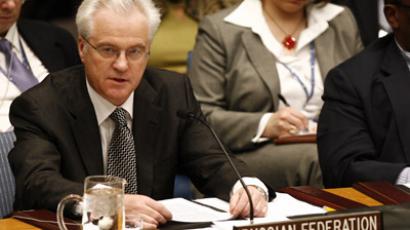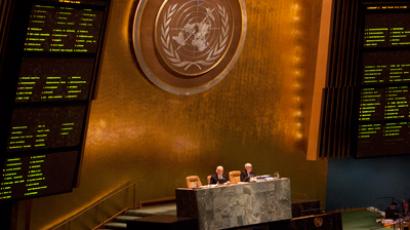Mainstream media self-censorship
Plummeting ratings for mainstream media news networks mean one thing - American viewers have had enough and are switching off. RT takes a look at why TV viewers seem to be turning elsewhere for real information.
Cherry picked facts – check. Unwelcome points of view discarded – check. Cookie cutter narrative no matter how a story develops – check.America’s mainstream media rarely questions the need for military intervention.“At the height of the war with Iraq, there was a study that showed that out of 317 people interviewed on American television, only 3 opposed the war”, said media critic and blogger Danny Schechter. To Iran, to Libya, to Syria – the Western mainstream media seems to have lost the desire to critically assess information. Copy-pasting official press releases instead, and self-imposing censorship. “If you are extremely driven by a particular point of view, you tend to select facts that support your point of view. That makes you an advocate, it doesn’t make you a journalist”, said Schechter. Take Syria – the current foreign policy story making headlines.Author and journalist Sharmine Narwani – contributor to the Huffington Post – says her Syria articles questioning the official story – were rejected.To Narwani, Western media coverage is a theatre of the absurd. “These people are flown in first class, they have staff, they have support staff for those staff members, they move in large groups. They have vans, and drives and translators. You’re not going in quietly. You’re coming in lights, camera, action”, she explained.Viewers are given little, if any, background to the issues causing the crisis. What's also missing is balance. “They’ll go straight to opposition leaders in X place. They’ll go straight for the things that validate their perspective, or the perspective of their Governments, frankly. Instead of seeking out alternative information, information that may be challenges the dominant narrative”, said Narwani. In Syria that narrative is clear – it’s a government crackdown on civilian protesters.In reality, armed groups, and reportedly even Al Qaeda, are part of the uprising.This is left out of mainstream reports – whether knowingly, or due to ignorance. “Nobody that I know who is a so-called serious commentator on Syria is able to define exactly who the Syrian opposition is, what their goals are, or really knows much about the history of Syria or its geography, or its demographics – they really don’t know much at all”, said editorial columnist and author Ted Rall. This has created an information black-out – with a major chunk of the story unavailable to viewers, what is shown being of questionable value.“A shaky cell phone footage taken of something that doesn’t even address the basic journalism questions of who, what, when, how? But they’re happy to put their on the screens”, said Sharmine Narwani. Creating entertainment, instead of journalism. “A cynic would say, it’s such a popular issue in western capitals that the media decided to go all in, and you’ll see Anderson Cooper saying “I can’t believe it, this is the worst thing that’s ever happened. And its like, did you hear of Sri Lanka? Ever heard of the Congo? Have you heard of Sudan where 2 million people were killed?” said Inner City Press journalist Matthew Lee. Whether they have or not, few reporters have the guts to be the odd man out. “There must be some of them that are actually aware of what the reality is. The facts are not hidden; they are out in the open. History is not hidden”, said journalist Don Debar. But fear of losing access tempers the desire to stray from the official storyline. Cash also matters. “These are news corporations. They are in the business of making money. And it’s no secret that whether you’re invading Iraq, or you’re invading Afghanistan, or your saber-rattling with Iran, that cable channels do better when there is a crisis at hand”, said Ted Rall. Whoever pays chooses the tune. “The interests of the advertisers are the interests of Wall Street and corporate America”, explained Don Debar. All this leave the American viewer poorly served by the mainstream media. While the bad guys change, the angle remains the same. So Iran will be a threat regardless of facts proving the opposite. An uprising favored by the West – no matter the troubling reality – will be portrayed as civilians crushed by a brutal regime. The self-imposed censorship will remain on American TV screens, while the truth is kept further away.














